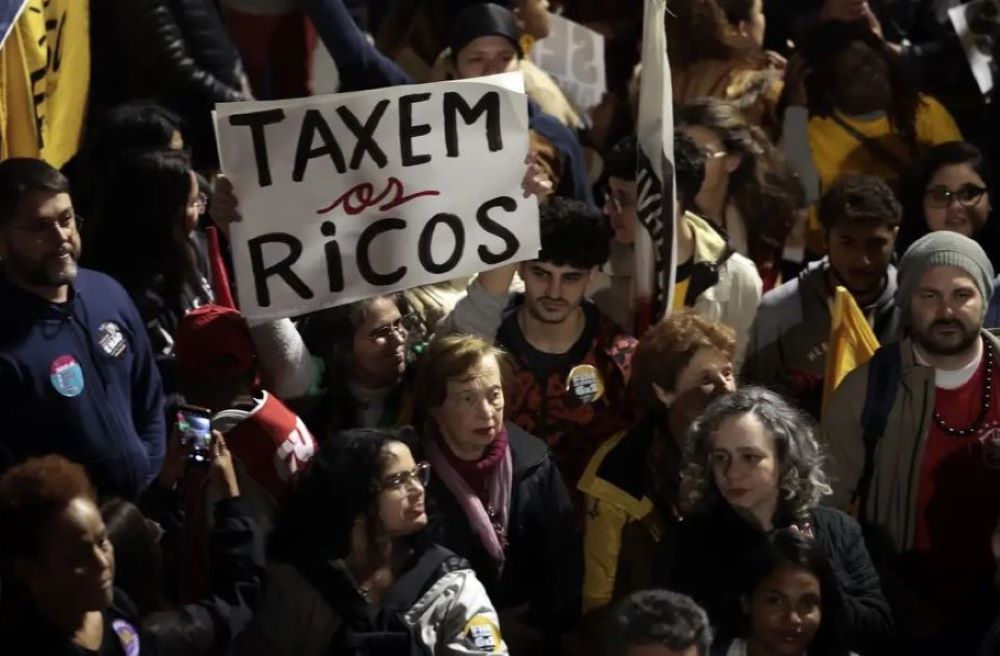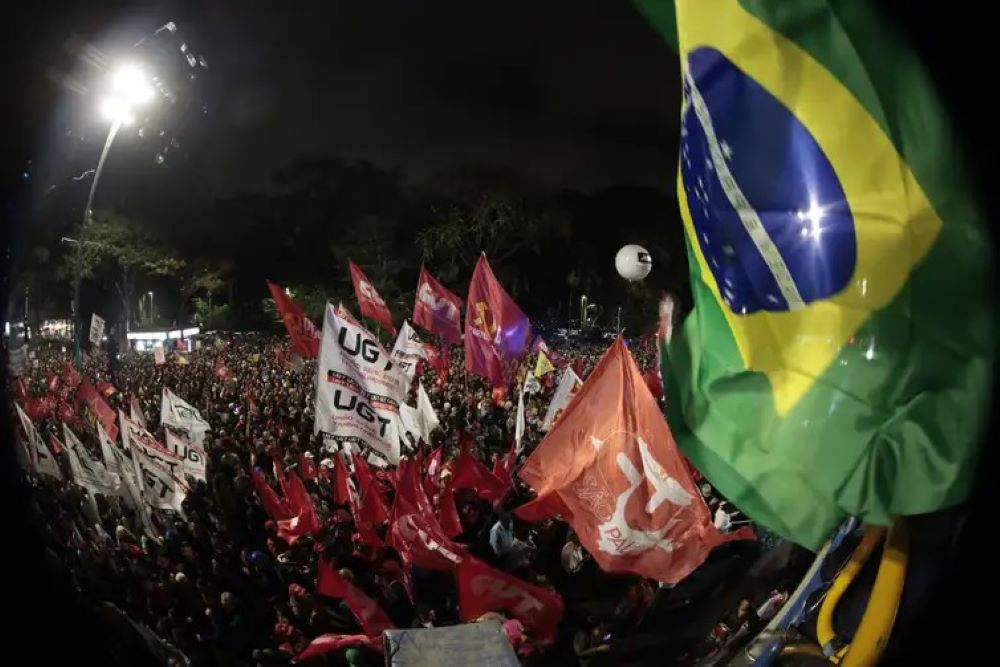
Protesters hold signs that say "tax the rich" during a demonstration against antipopular measures of the Brazilian Congress and U.S. President Donald Trump's 50% tariffs in São Paulo, Brazil on July 10. (Agência Brasil/Paulo Pinto)
Amid rising social unrest in Brazil, U.S. President Donald Trump's decision to impose a 50% tariff on the country's products has spurred outrage among many Brazilians, who staged demonstrations in São Paulo and other cities.
Brazilian Catholics, especially those connected to grassroots movements and social pastoral ministries, have criticized the tariff and accuse Trump of inserting himself in the country's politics by supporting its previous president, Jair Bolsonaro, a conservative Catholic with close ties to evangelical Christians and is sometimes called the Trump of the tropics.
In a July 9 letter to President Luiz Inácio Lula da Silva, Trump said he "knew and dealt with former President Jair Bolsonaro," who is facing a "witch hunt that should end IMMEDIATELY."
Bolsonaro, who ruled Brazil 2019-2023, has been facing a trial at the Supreme Court for allegedly attempting to stage a coup d'état after losing the 2022 election to Luiz Inácio Lula da Silva, who also is Catholic.
Carlos Cordeiro, a lay Catholic and an activist of social pastoral ministries in the working-class district of Vila Brasilândia, in São Paulo, told the National Catholic Reporter that Lula is right to react with caution to Trump's letter.
"And, of course, he's right to announce that the U.S. tariff will be met with reciprocity measures from Brazil," said Cordeiro, who is an economist.
He hopes that the Brazilian bishops' conference — which has yet to release a statement on the tariffs — won't take too long to respond.
"It will be very disappointing if the Brazilian episcopate fails to express its opinion against such an unprecedented attack," Cordeiro said. "But the laypeople of the social pastoral ministries won't fail and will keep struggling."
Trump on July 12 announced 30% tariffs on imports from Mexico and the European Union. The new tariffs, including on Brazil, are set to take effect Aug. 1.
Catholics make up 57% of Brazil's population, down from 65% in 2010, according to the Brazilian Institute of Geography and Statistics. The number of Evangelicals increased to nearly 27%, up from 22%.
Advertisement
A lengthy report released in November by the Federal Police outlined a wide conspiracy of high-ranking military officers and members of Bolsonaro's entourage to impede Lula from taking office.
A group of officers also planned to detain and kill Lula, Supreme Court Justice Alexandre de Moraes and Vice President Geraldo Alckmin, officials said.
On Jan. 8, 2023, one week after Lula took office, thousands of Bolsonaro's supporters invaded and vandalized government buildings in Brasilia, an event compared to the Jan. 6, 2021, attack on the U.S. Capitol.
Bolsonaro and his backers argue that the trial is political and accuse de Moraes of persecuting their group in order to prevent Bolsonaro from winning next year's election and returning to power. The former leader is currently forbidden to run for government offices for eight years.
De Moraes also leads a criminal investigation on the dissemination of politically motivated fake news on social media. Bolsonaro's group is accused of being behind the disinformation campaign. It argues that the Supreme Court is trying to impose censorship in Brazil.
In his letter, Trump echoed the theory, arguing that Brazil has been curtailing the free speech rights of U.S. social media platforms. The president also claims that Brazil has unduly benefited over years of bilateral trade and the 50% tariff is lower than it should be.

Members of labor unions and social movements protest against antipopular measures of the Congress and Trump's 50% tariffs in São Paulo, Brazil, on July 10. (Agência Brasil/Paulo Pinto)
Franciscan Br. Sérgio Görgen, a longtime activist in Brazil's Small Farmers Movement and a member of the Josimo community, said that Trump's tariff is motivated more by geopolitical reasons than his support for Bolsonaro.
"Brazil is a leading member of the BRICS [a block formed by Brazil, Russia, India, China, and South Africa, plus new members Egypt, Ethiopia, Indonesia, Iran, Saudi Arabia and the United Arab Emirates] and has a power of agglutination in Latin America," Görgen said.
Görgen, an experienced social analyst, argued that Trump doesn't know how to act in the face of a rising multipolar world order and wants to limit Brazil's power.
According to Eduardo Brasileiro, who coordinates the Brazilian articulation for the Economy of Francesco, Trump's measure is a direct attack on Brazil's democracy, economy and sovereignty.
"We have seen progressive movements going back to the streets to protest against measures taken by the Brazilian Congress, so that's the time to discuss not only the U.S. tariff, but what kind of economy we want in Brazil," he said.
On July 10, activists protested in São Paulo and other cities for more taxes on super rich people and against the 6-on-1-off work schedule currently legal in Brazil. In November 2024, Rep. Erika Hilton introduced a bill to reduce the weekly work schedule to four days (with three days off), but the majority of the Brazilian Congress opposes the proposal.
Trump's tariff announcement drew more people to the demonstrations. Dolls representing Bolsonaro and Trump were seen in the protests.
"That's a strategic move for Trump, who wants not only to intervene against Lula in next year's election but also to reduce the power of the BRICS," Brasileiro said.
Cordeiro said that Brazil has had deficits in its bilateral trade with the U.S. — contrary to what Trump said — and that even Bolsonaro's supporters have been outraged by the 50% tariff.
"That must be a moment of unity in Brazil. Pope Francis used to say that we can't support policies that go against common good," Cordeiro said.
About 12% of Brazil's exports go to the U.S., mainly oil, iron ore, steel and machinery. Agribusiness represents an important part of Brazilian exports as well, especially sugar, coffee, beef and orange juice.
"Many of the businessmen of those areas are Bolsonarist, but they have been talking to Lula's administration about the potential solutions to that crisis," Cordeiro said.





